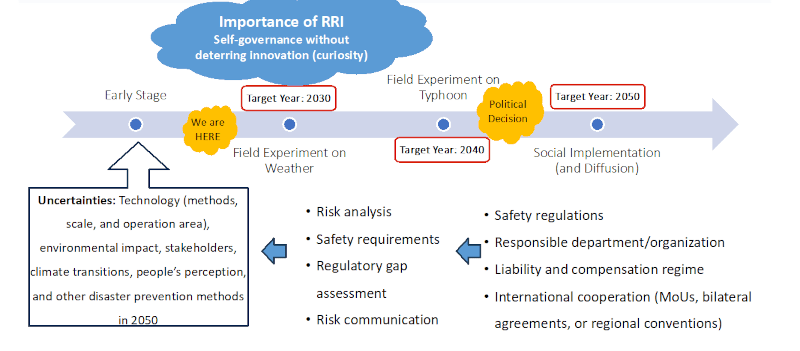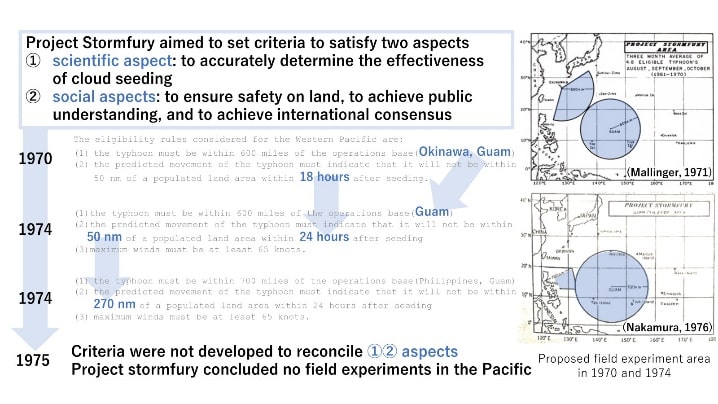Progress Report
Typhoon Control Research Aiming for a Safe and Prosperous Society[4] Examining ELSI on Typhoon Control
Progress until FY2024
1. Outline of the project
Controlling typhoons is expected to result in social benefits such as disaster prevention and mitigation. This "social implementation" of typhoon control technology has already been mentioned in the Basic Act on Disaster Management (Law No. 223 of 1961), enacted in response to the catastrophe of the Ise Bay Typhoon of 1959.
Most of weather modification, including typhoon control, may cause negative impacts on third parties other than those who benefit from them (beneficiaries). Let us assume: is it ethically permissible to apply typhoon control technology when, even if it is possible to prevent a river A from overflowing, that rain will fall in another area B, resulting in a landslide disaster? Also, if the attempt to control happens to have an unpredictable negative impact on a third party (meaning that the "control" fails), who should bear this loss and how?
This group, led by researchers in the humanities and social sciences, will examine the ethical, legal, and social issues (ELSI) that may arise from the social implementation of typhoon control. It will also serve as a hub for members participating in this project.
2. Outcome so far
In FY2024, this group (1) evaluated the feasibility of respective control methods for control from an ELSI perspective, and (2) drafted various documents including ethical principles and guidelines for small-scale field experiments.
(1) The core project tried to identify possible control methods and examined the feasibility of each method from various perspectives. For this group, the feasibility (excluding engineering and costs) of eight control methods, including crowd seeding, were assessed from the following aspects: (a) scenario up to social implementation, (b) permissibility under the current legislation, (c) possible concerns and stakeholders, and (d) positive factors (year-round use, possibility of diversion for other uses, industrial promotion, etc.) (Figure 1).

(2) At the stage when new science and technology is implemented in society, it is assumed that the risks associated with the activity have been identified to some extent and that implementation requirements, safety standards and compensation systems have been established accordingly. However, when research is in its early stages, it is difficult to identify risks and develop specific standards. At this stage, governance through self-regulatory frameworks is important (Figure 2). Therefore, this group has developed (a) ethical principles (seven principles) and (b) draft guidelines for conducting small-scale field experiments (seven articles) to implement self-regulation for the early stages. These document preparation activities are carried out in collaboration with the Joint Research Group of ELSI (which became the ELSI Basic Unit from FY2025).
(3) In order to contribute to the analysis in (1) and the draft documents described in (2), this group has conducted the following basic studies: research on the governance in past weather control projects such as the U.S. Stormfury Project (1962-83) (Figure 3), social surveys on typhoon disaster prevention (interviews with the municipal disaster prevention sector), and examination on issues related to ethics and justice.


3. Future plans
In FY2025, this group will encourage open discussion for finalizing and publishing the above draft documents and applying them to the MS8 research and field experiment projects.